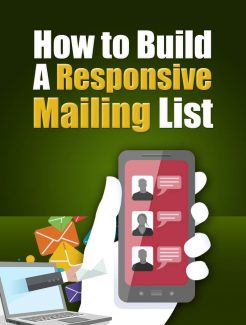
 License Type: Private Label Rights
License Type: Private Label Rights  File Type: ZIP
File Type: ZIP
 SKU: 59598
SKU: 59598  Shipping: Online Download
Shipping: Online Download
Ebook Sample Content Preview:
SECRETS TO RESPONSIVE LISTS
Every online marketer understands that the best way to generate sales is to have a large email list of subscribers. After they build that list, however, many marketers begin to recognize that the list is large, but it doesn't function to create sales. That's because it wasn't built with the idea of creating a responsive list, and instead focused on quantity instead of quality.
The time to start building the right type of list is just as you get started, but even if you've already got a list, you can still tweak your business processes to get a better response after the fact.
PAY ATTENTION TO HOW YOU CREATE THAT LIST
The biggest secret isn't that you need a huge number of people on the list, but that you want a better conversion of subscribers to customers. You can do this by paying attention to how you are creating the list, how you are marketing it, and what is actually happening when you send out an offer. Here are some basic things you should know about a responsive mailing list.
Buying email addresses doesn't work
For the most part, you can buy thousands of emails on another person's contact list and still generate very poor sales. The secret to creating a good list is to build one up naturally and organically so that people have a good relationship with you and your business.
Single opt-ins can be fooled
You may put out an opt-in list and be congratulating yourself on the number of sign-ups, that is, until you find out many are fakes or generated by online bots. Learn how to use a double opt-in strategy to build a better list.
Targeted demographics are better than niches Demographics tell you the reasons why people buy, while niches just assume everyone on your list is interested. You will have better luck by understanding the psychology of your list, rather than just relying on categoric niches, for email marketing.
Automate what you can
There are plenty of products and services to help streamline your online business. There's no reason why you should be struggling with responding to each and every email, unless there is some reason for personally responding. Learning about the technologies and tools available can save you valuable time and increase your bottom line.
People do have a price
It's up to you to figure out what that price is. It may be that they are willing to subscribe if you give them a free short report. It might be that they will do it to enter a contest. It might be that they will reply to an email when they see a savings in a product they like or when they get your personal attention. Pay attention and do what works for you.
ORGANIC IS BETTER
Organic, or naturally occurring lists, generally are quite a bit more responsive than lists created by buying email addresses from other marketers. The reasons for this are that bought lists can contain a number of bad email addresses or contain people on them who are getting so much email from other marketers, that they ignore everything as spam. One last reason, and the biggest reason, to use organic lists is that you can be liable for sending email to an address that hasn't opted in to having their email published.
When you build your own organic lists, you know that the person has specifically requested to subscribe to your list and are genuinely interested in either you or your business.
WAYS TO CREATE ORGANIC LISTS
In this age of social networking, you will find that it isn't as hard as it used to be to create an organic list. People are networking more and more online, and all you need to figure out is how to put the power of the Internet at your fingertips. Don't just put an opt-in form on your website and expect that using that simple action will generate a large organic list for you. People will still have to find your site, and if your traffic is low, this can be a major stumbling block. The solution is to not just advertise your opt-in on your site, but to do it elsewhere where traffic that is interested in your niche congregates. That's where social networking comes into play.
Get in the habit of building an online presence on various social networking sites. You will have to post a profile and start networking with people on these sites to hook into potential customers. Once you have them interested in either who you are or some common interests (related to what you market), you can start posting updates or links to things that you want to promote to get traffic from these sites back to your opt-in offers.
PLACES TO NETWORK ONLINE
www.facebook.com
Facebook has a very crisp, business-like interface that helps you to maintain a more professional image for your profile. Join groups, network with likeminded people, or even advertise within Facebook. It's a great way to find demographics very quickly.
www.twitter.com
For people who don't have enough time to put up a full profile, just hop onto Twitter. Using 140 characters in each update, you can build up a quick following without too much time involved.
www.linkedin.com
This is more of a business directory, but also a great place to network.
DEMOGRAPHICS ARE KEY
Internet marketers will tell you that when you go to set up a website or online business, you have to pick a hot niche. That is completely true, as without a hot niche, you have less chance of generating enough traffic to make good sales.
However, when you go to market that niche via email lists, you will find that you will need to market to demographics more than to a niche. In other words, you will want to focus on getting up close and personal with your prospective buyers, instead of just assuming that they want to buy your products because they signed up to your list.
WHO ARE THESE PEOPLE?
Demographics are typically segregated into a few marketing categories: gender, age, income bracket, ethnicity, and education level. Of course, you can set up any number of demographic variables to help you market to your niche, but these are pretty standard. Just knowing several of these demographics about who is visiting your site can substantially help you to increase the responsiveness of your list. How? The trick is to send emails that talk personally to a specific group's needs and provides that demographic with solutions to the problems that they see day to day.
For instance, say you are marketing laptops. You want a demographic of college-aged students or business professionals who require this piece of equipment. You may also find that they need to be within a specific income bracket. You can put up surveys on your site and reward people for identifying who they are and what demographic they fall into. After that, you take that information and you set up different lists.
The one with college-aged students gets emails on how laptops can help them to complete assignments in between class or to take their studies with them anywhere. The email that goes to business people may target people who are in their cars (like real estate agents) or who spend a lot of time travelling for business. In that case, the biggest benefit is that it will increase their work productivity as they get the essentials of their business travel done.
SPLIT YOUR MAILING LISTS INTO DEMOGRAPHICS
Once you start to figure out why people are buying, you can start to separate people into different mailing lists, according to their demographics. You can set up one list for 18- to 25-year olds and another for those over 30.
Next time you want to send out a promotion for a particular product or service, you will have a good idea what psychological triggers work best with either list.
TECHNOLOGY TO TRACK RESPONSIVENESS
Once you start building mailing lists for marketing purposes, you will find that there are tools and services out there to help simplify the process. There's no reason why you have to learn how to build a responsive mailing list from scratch when you can use the tools and services provided by others. Just make sure that they are simplifying your life and not complicating it. Here are some tools or services that can help you do just that, while encouraging your subscribers to be more responsive.







